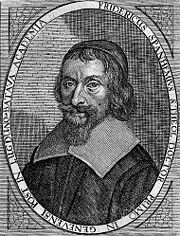
Friedrich Spanheim
Encyclopedia

Calvinism
Calvinism is a Protestant theological system and an approach to the Christian life...
theology professor at the University of Leiden.
Life
He entered in 1614 the University of Heidelberg where he studied philologyPhilology
Philology is the study of language in written historical sources; it is a combination of literary studies, history and linguistics.Classical philology is the philology of Greek and Classical Latin...
and philosophy
Philosophy
Philosophy is the study of general and fundamental problems, such as those connected with existence, knowledge, values, reason, mind, and language. Philosophy is distinguished from other ways of addressing such problems by its critical, generally systematic approach and its reliance on rational...
, and in 1619 removed to Geneva to study theology
Theology
Theology is the systematic and rational study of religion and its influences and of the nature of religious truths, or the learned profession acquired by completing specialized training in religious studies, usually at a university or school of divinity or seminary.-Definition:Augustine of Hippo...
. In 1621 he became tutor in the house of Jean de Bonne, Baron de Vitrolle, governor of Embrun in Dauphiné, and after three years he visited Geneva, and Paris
Paris
Paris is the capital and largest city in France, situated on the river Seine, in northern France, at the heart of the Île-de-France region...
, and England
England
England is a country that is part of the United Kingdom. It shares land borders with Scotland to the north and Wales to the west; the Irish Sea is to the north west, the Celtic Sea to the south west, with the North Sea to the east and the English Channel to the south separating it from continental...
, returning to Geneva in 1626 and becoming professor of philosophy. In 1631 he went over to the theological faculty, and was rector of the academy from 1633 to 1637.
In 1642 he removed to Leiden as professor of theology. In Holland Spanheim became one of the most decided defenders of the Calvinistic doctrine of predestination
Predestination
Predestination, in theology is the doctrine that all events have been willed by God. John Calvin interpreted biblical predestination to mean that God willed eternal damnation for some people and salvation for others...
against Moise Amyraut.
Works
He published anonymously, Le Soldat suedois (1633), a history of the Thirty Years' WarThirty Years' War
The Thirty Years' War was fought primarily in what is now Germany, and at various points involved most countries in Europe. It was one of the most destructive conflicts in European history....
until 1631 and Le Mercure suisse (1634); Commentaire historique de la vie et de la mort de . . Christofle Vicomte de Dohna (1639).
His principal theological works are:
- Dubia evangelica (3 vols., Geneva, 1631-1639)
- Disputatio de gratia universali (3 vols., Leiden, 1644-1648)
- Epistola ad Buchananum super controversiis...in ecclesiis Anglicanis (Leiden, 1645).
Against the Anabaptist
Anabaptist
Anabaptists are Protestant Christians of the Radical Reformation of 16th-century Europe, and their direct descendants, particularly the Amish, Brethren, Hutterites, and Mennonites....
s he wrote Variae disputationes anti-Anabaptisticae (1643) and Diatribe historica de origine, progressu, sectis et nominibus anabaptistarum (1645; English translation, Englands Warning by Germanies Woe, London, 1646).

